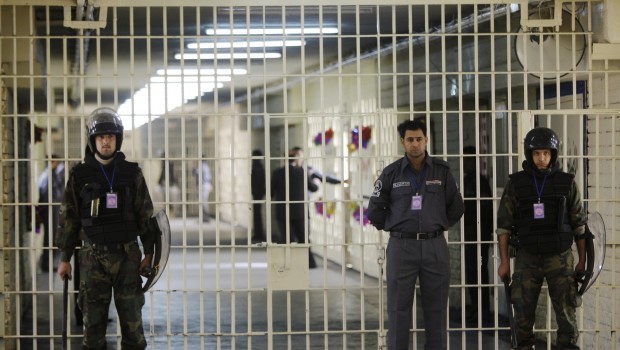
In this February 21, 2009, file photo, guards stand at a cell block at Abu Ghraib prison on the outskirts of Baghdad, Iraq. (AP Photo/Karim Kadim, File)
Baghdad, Asharq Al-Awsat—An Iraqi parliamentary report on last month’s attacks on Abu Ghraib and Taji prisons has blamed failures in the ministries of justice and the interior for the success of the attack, Asharq Al-Awsat has learned.
Speaking exclusively to Asharq Al-Awsat, Kurdistan Alliance MP Shwan Taha, a member of the parliamentary committee for security and defense, said that some of the facts of the “incident that took place more than a month ago have been concealed for many reasons relating to several issues, most importantly the ones about security leaders.”
“The first problem we faced as an investigation committee was that the Operations Command in Baghdad prevented us from gaining access to the prison to carry out an investigation,” he added.
Taha added: “When we were allowed to go to the prisons and the site of the attack, the only response we got from the officials and guards there, whether the ones from the Ministry of Justice or the [Ministry of the] Interior, was ‘We do not know anything.’”
When asked why, he said, “They do not have information about what happened. Everyone said they were new and that all former members of staff have been transferred,” adding that this indicates a deliberate blackout has taken place.
Regarding the circumstances surrounding the incident, Taha said: “There was a sort of breach and most of the attack took place from the inside, starting from smashing doors and provoking riots, in addition to cutting electricity off during the operation.”
Taha said that when he contacted the Abu Ghraib electricity department about any power cuts made in the area when the attack happened, they denied any knowledge.
This indicates that some special measures have been taken inside the prison, Taha told Asharq Al-Awsat.
While the report acquitted the Iraqi Ministry of Electricity, it placed “full responsibility on ministries of justice and the interior.”
“In the recommendations we submitted to the government’s executive agencies, we emphasized the need to punish five senior officers, including division commanders and federal police chiefs, as well as other officials,” he said.
Regarding the nature of mistakes committed by the ministries of the interior and justice, Taha said that the report found that both ministries had been negligent.
This has prompted the committee charged with investigating the incident to “recommend that four other officials from the department of reform, a division of the Ministry of Justice, be punished.”
As for claims that the Iraqi government had intelligence about a potential attack on Abu Ghraib prison, the Iraqi MP said: “True, a telegram indeed arrived, but when we questioned the competent authorities why they ignored the telegram. They assured us that they receive many false telegrams every day.”
According to Taha, of the 1000 Al-Qaeda members who escaped from prison only 400 have been re-captured to date.
The report found that the final casualty toll reached 12 dead and 44 injured among the interior ministry staff and two dead and eight injured from the Department of Prisons.
According to the report, 71 prisoners were killed in the operation.
